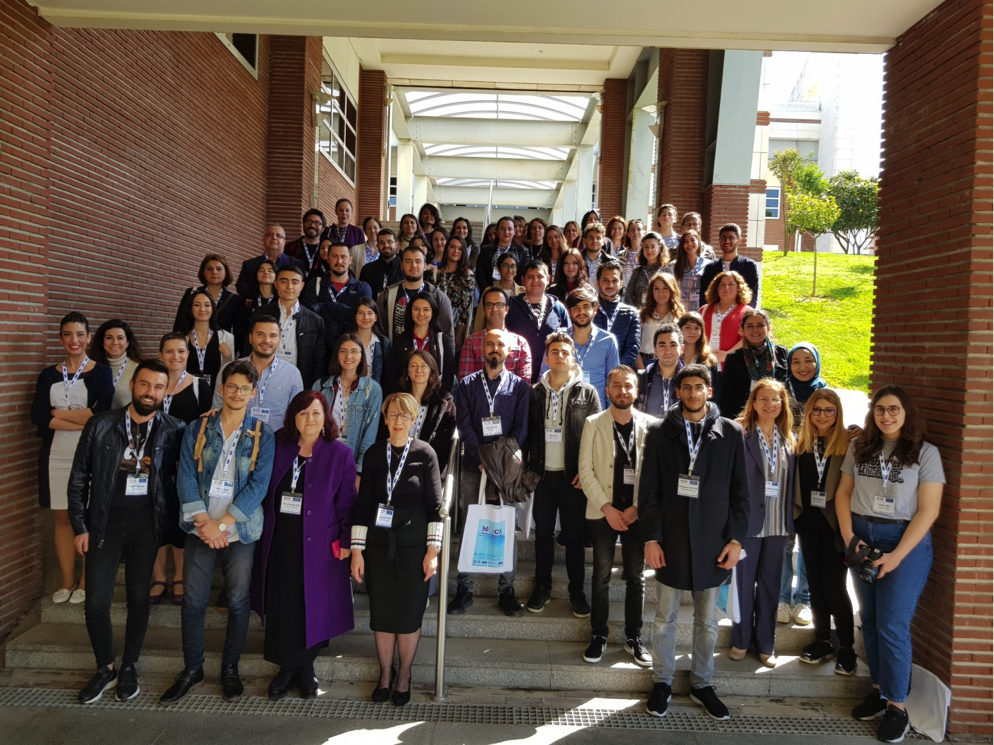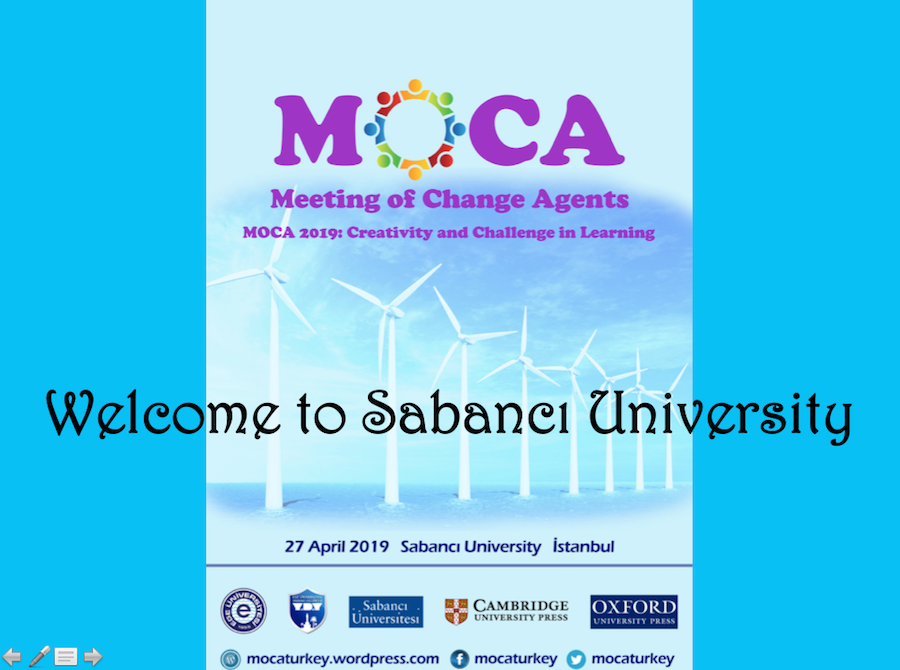MOCA 2019 Event
MOCA 2019 Event
Hosted by
Sabanci University School of Languages

(The Review Penned by Mine Bağ)
Meeting of Change Agents (MOCA) was initiated by Ege University School of Foreign Languages in 2017 with a view to convene related parties in the teaching and learning of English at preparatory schools to discuss issues, share opinions, practices and experiences, and explore options together. MOCA gathering is an annual event, the first of which was hosted by the founding team at Ege University. The second MOCA event took place in Ankara, hosted by TED University, and SU SL had the opportunity and pleasure to host the third one.
The theme of the third MOCA get–together was ‘Creativity and Challenge in Learning’.
MOCA 2019 hosted 52 participants from 26 institutions. The participants had two Focus Groups discussion sessions in 6 groups consisting of mixed groups of learners and teachers from different institutions in each, besides morning and afternoon plenary sessions.
Here you will find a list of all SL members who contributed, participated and helped the event in various ways.
Welcoming Remarks and the Plenary Session Presentation: Jacqueline Einer
SU Student Representative: Zeynep Akant
Student helpers: Rümeysa Yüncü, Aysun Ogut, Kaan Ersöz
Presenter SL Student: Tuana Rutkay
SL student representative in focus group: Alperen Yıldız
SL Organizing team members: Deniz Kurtoğlu Eken, Şila Yosulçay Uz, Dalince Congara, Mine Münevver Bağ
Focus group Moderators: Deniz Cicekoglu Daryavuz, Deniz Renda, Dilek Eryilmaz Salki, Suzan Altiparmak, Seyran Erdogan, Ahmed Elmahi
SL Teacher representative in focus group: Nazan Gelbal
Photography: Pınar Gündüz
Admin support: Ebru Özgür Katı, Büşra Işık
THE DAY
The MOCA event started with opening remarks by Jacqueline Einer, followed by the student representative Zeynep Akant sharing her experiences and feelings as a MOCA participant in the previous year at TED University and as an SL student, explaining the characteristics of the preparatory year course and the strands covered within. MOCA 2019 hosting team member Mine Bağ did a presentation emphasizing the main messages of what creativity is referring to the source material ‘WAYS OF PROMOTING CREATIVITY IN ELF CLASSROOM’ (Hrešć, T., 2016) shared as the pre-event reading task before.
One main new feature of the MOCA 2019 event was the plenary session done in English by SL Director Jacqueline Einer on Creativity and Challenge.
In groups consisting of both teachers and learners, as mentioned above, the morning focus group discussions explored the topics areas such as;
•the definitions of creativity and challenge
•whether creativity can be taught
•what can be the connection between challenge and creativity in learning
•some samples of creative activities used in and out of class
•what some activities that can pose a challenge in a positive way are
Afternoon session focus groups dealt with the additional points such as;
•what type of a relationship could exist between creativity and individual differences
•what methods can address the varying needs
•could there be a correlation between standardization and creativity
•whether they set barriers for each other
The outcomes of the discussions were turned into presentations and shared as slide shows in the afternoon plenary session by student participants supported by a couple of teachers.
The afternoon plenary session was concluded with an enlightening closing-remarks talk by Tuğba Yegin, the coordinator of the MOCA founding team. Her talk emphasized what creativity involves, and Yegin recommended the book How to Fail Successfully by Jack Matson also mentioning the course he offers at University of Michigan, Failure 101, which must be very informative as a foundation to search for creative ways for success driven by the experiences of failure cases.
Two questions were directed to the participants by the hosting team member Deniz Kurtoğlu Eken, and answers were collected in written form. These topics involved:
•What is one idea you would take away with you as a product of the day?
•What topic area would you suggest as a theme for the next MOCA event?
The answers were compiled by Şila Yosulçay Uz, and seem to have clustered around the topic areas below.
The ideas to take away with them by the participants included:
•creativity needs to be let free but may not be taught
•challenge needs to be taken positively and constructively
•a set of activities such as interviews, games, free writing , drama and cartoons could be exploited
•the need for variety
(A complete list of ideas is included in the attached end-of-day feedback document).
The themes that can be considered for the next MOCA gathering are about the general topic areas:
•learner and teacher motivation
•use of technology
•assessment and testing
•culture and language
•learner autonomy
•generation Z
•extra-curricular activities and individual differences
At the end of the day, Doğuş University was selected as the next hosting institution for MOCA 2020.
You may find more detailed information, photos and video recordings at the website www.mocaturkey.wordpress.com

